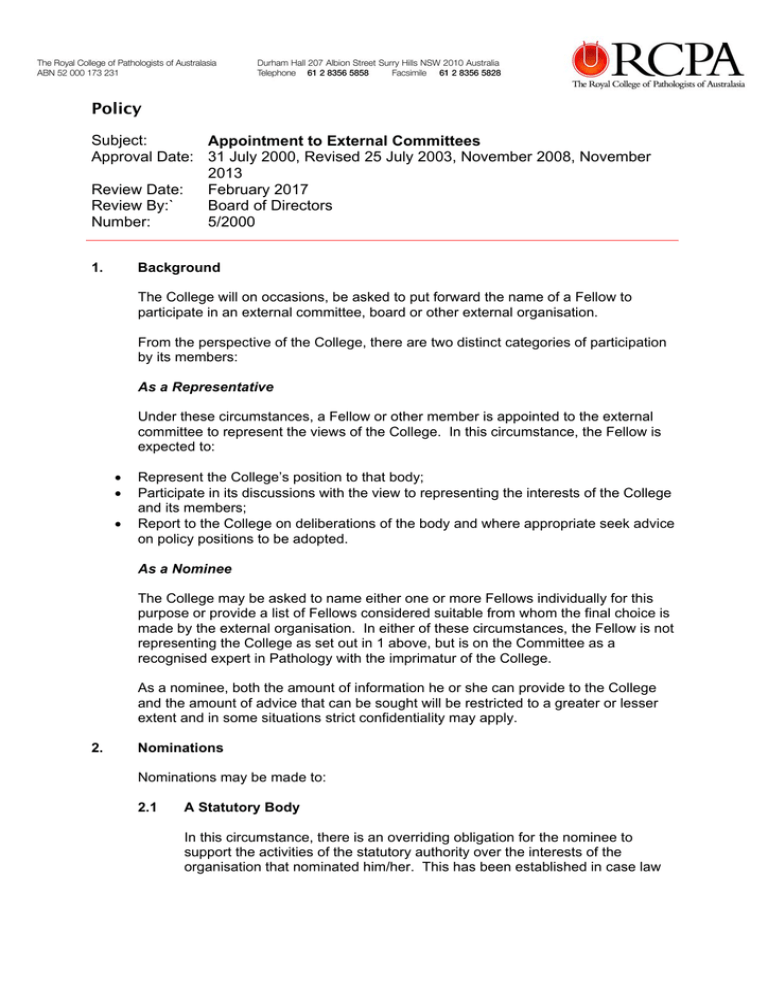Policy
advertisement

Policy Subject: Appointment to External Committees Approval Date: 31 July 2000, Revised 25 July 2003, November 2008, November 2013 Review Date: February 2017 Review By:` Board of Directors Number: 5/2000 1. Background The College will on occasions, be asked to put forward the name of a Fellow to participate in an external committee, board or other external organisation. From the perspective of the College, there are two distinct categories of participation by its members: As a Representative Under these circumstances, a Fellow or other member is appointed to the external committee to represent the views of the College. In this circumstance, the Fellow is expected to: • • • Represent the College’s position to that body; Participate in its discussions with the view to representing the interests of the College and its members; Report to the College on deliberations of the body and where appropriate seek advice on policy positions to be adopted. As a Nominee The College may be asked to name either one or more Fellows individually for this purpose or provide a list of Fellows considered suitable from whom the final choice is made by the external organisation. In either of these circumstances, the Fellow is not representing the College as set out in 1 above, but is on the Committee as a recognised expert in Pathology with the imprimatur of the College. As a nominee, both the amount of information he or she can provide to the College and the amount of advice that can be sought will be restricted to a greater or lesser extent and in some situations strict confidentiality may apply. 2. Nominations Nominations may be made to: 2.1 A Statutory Body In this circumstance, there is an overriding obligation for the nominee to support the activities of the statutory authority over the interests of the organisation that nominated him/her. This has been established in case law in the matter, Bennetts v Board of the Commissioners of New South Wales and Ors, Supreme Court of New South Wales, 1967. “Once a group has elected a member he assumes office as a member of the Board and becomes subject to the overriding and predominant duty to serve the interests of the Board in preference, on every occasion upon which any conflict might arise, to serving the interests of the group which appointed him”. It is obvious in this circumstance the ability to report back to the College is limited. 2.2 Advisory Committees, Ministerial and other In these circumstances the relationship between the nominee and the College may vary depending on the following points: • The basis on which the committee is established (eg. whether under legislation and if so, the actual provisions of the legislation); • Whether it is an expert committee or a representative committee (in the simplest terms, is the appointee expected to contribute on the basis of his own knowledge and expertise or to convey the views of the organisation which nominated him/her); • Whether the appointee is individually nominated and appointed or on the other hand, appointed from a panel of names submitted by their nominating organisation; • Any limitations imposed by the terms of reference of the committee; • Any limitation decided by a formal vote of the committee. 3. Process of Appointment The Board of Directors of the College has the responsibility of appointment of Fellows to external bodies. With the exception outlined in 5 below, no other committee of the College or individual Fellow may make appointments to an external committee. i) On receipt of the request for a Fellow to participate in an external committee, the request will be distributed to the members of the Board of Directors for consideration. They may in turn ask the opinions of Council, a major committee, or Advisory Committee. ii) In responding to the request for appointment, the Board of Directors will consider whether it is appropriate for the College to be involved in the committee/organisation, taking into consideration its role, the time commitments and any expenses the College may incur by participating. In particular, when making such appointments, the Board of Directors must clarify the issue of indemnity for the College and the Fellow in relation to participating in the Committee should any legal challenges arise. iii) The appointment may be made by circulating documentation to members of the Board of Directors. If, however, there is a lack of unanimity, the appointment will be discussed at the next Board of Directors meeting. iv) A central registry of all nominations to external committees will be kept at the College. 2 4. Responsibilities 4.1 Responsibilities of Representatives Those Fellows who represent the College on an external committee, have a responsibility to ensure they consult with appropriate College committee(s) and Fellow(s) to ensure, as far as possible, that the views they express at the external committee are representative of the views of the College and not purely personal views. Representatives should be aware that any policy statement by the College is binding. The Fellow is expected to report back to the Board of Directors any important matters arising from the Committee in a timely manner. 4.2 Responsibilities of Nominees The responsibilities of Nominees to the College are constrained by the considerations set out above in section 2.2. However, to the extent permitted by the rules of the committee or body on which they sit, Fellows are expected to consult with the relevant committee and other Fellows of the College and report back to the College as appropriate. The nominee will be asked to report to the College at least annually on activities of the committee that he/she is able to divulge. 5. Nominations to Committees at the State Level and New Zealand Committees By-law 11/1999 “Role and Functioning of State Committees and the Committee for New Zealand” is relevant. In the event that the College is asked to put forward the name of a Fellow to be either a Representative or a Nominee of the College for a Committee that operates only at a State level or in the case of New Zealand at a national level on issues only affecting New Zealand Fellows, then the relevant State Committee or Committee for New Zealand may select the appropriate Fellow using the same process and having regard to the same considerations as the Board of Directors as set out in 3 above. Once the appointment has been finalised it is required that the State Councillor or the Vice-President for New Zealand notifies the Chief Executive Officer of the appointment to ensure that the Committee/Organisation and the Fellow whose name has been selected are added to the College register established for this issue. Appointees in this category will be expected to report to, and liaise with, the relevant State Committee or the Committee for New Zealand in the same manner as prescribed in 4. above for appointments made by the Board of Directors. 3



